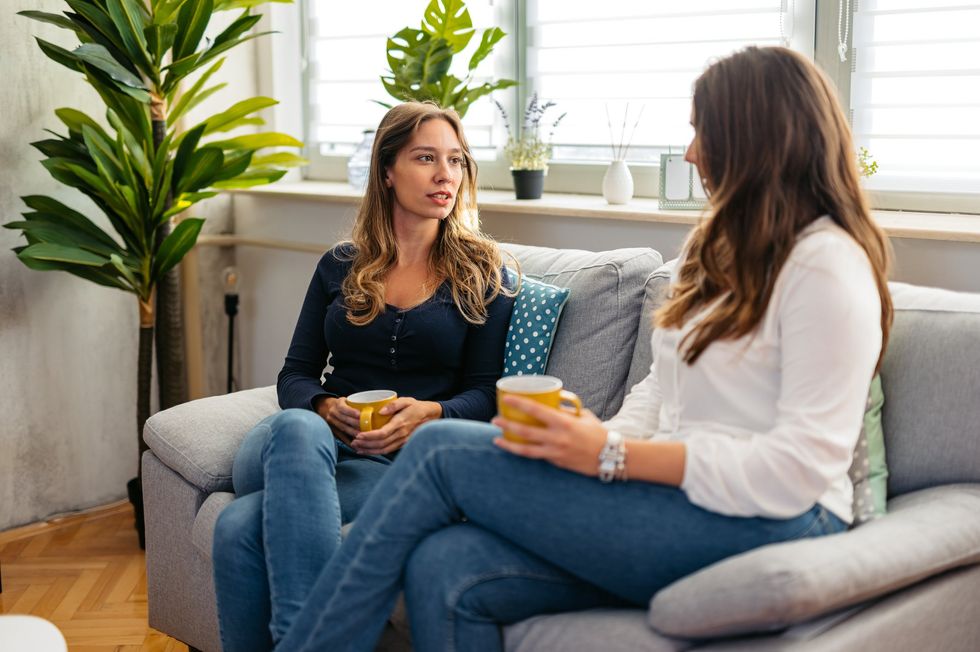Friendship breakups can be devastating and often lead you to wonder how someone who was once in your inner circle has transformed into someone you barely even recognise.
From Mean Girl-esque behaviour that should've never survived post-teenage years to money disputes and power dynamics, intentional exclusion, to that one person whose face almost cracks when you announce good news – the list goes on, and is personal to each individual.
The sad truth is that most of us will experience this harsh reality at some point in our lives. And while it's become the norm to discuss the ins and outs of romantic breakups and the fallout that follows, the dreaded "friendship breakup" has almost become the Voldemort of the relationship world, with people shying away from uttering a word with fears of "making things worse" or reliving something they're not yet ready to face.
It's about time we talk about it...
Clarissa Silva is a renowned behavioural scientist, researcher, and relationship coach with over 18 years of experience. She has since created a disruptive relationship method, Your Happiness Hypothesis (H20), by taking traditional psychological and behavioural science models and re-engineering them to provide a more effective approach.

Clarissa knows a thing or two when it comes to relationships, platonic and romantic. She believes that people often shy away from friendship breakup talk due to shame and that people often go through a self-persecution phase.
However, in reality, Clarissa reminds people that all they dealt with was "incongruence, in what you thought the person represented in your life and the reason you needed to have support in your life."
Clarissa often has clients who delve into their friendship breakups, or as she calls them, "friendship divorce". She sometimes even encourages them to have a divorce party, as she suggests that all relationship failures are "internalised and require healing".
In some cases, a friendship breakup can sting more than parting ways with a partner – but why is this?
According to Clarissa, friendships are more difficult to terminate because "we choose people that we think reflect ourselves and gradually fall in love with what that represents in our lives."
They're often more complicated to navigate because people obsessively persecute themselves over what went wrong, and people don't expect friendships to end. People frequently overlook or ignore beige flags in platonic relationships.
Clarissa offers three key tips to people currently experiencing a friendship breakup:
Restabilise your core security
"A breakup creates self-doubt, anger, rumination, and lowered self-esteem which makes us feel less than. Friendships help to provide some sense of security because of the familiarity and mutual growth you both developed over time. As you heal and become strengthened, you see very clearly why the relationship wasn’t ideal and what you need in your future support systems. Sometimes it’s not what we didn’t see in others, it’s what we wanted to see."
Don’t persecute yourself
"Allow yourself to heal because healing from a breakup is not linear. Don’t relive negative events that occurred in the relationship by recalling what happened or extracting an aspect to persecute yourself over again. You’re torturing yourself & subsequently delaying your own growth and healing. Relationships are choices that help you become a better person, or cope with life challenges positively, or help you grow."
Define your boundaries
"Mutually establish some boundaries early on that delineate a healthy friendship. Cover what means dismissive to you, and what mutual respect, trust, safety, and reciprocity entail."

Clarissa believes that while friendships are sometimes supposed to be challenging, there are benefits to cutting off someone who is straight-up toxic.
"Over time, surrounding yourself with toxic people not only erodes your self-esteem and sense of self; it creates maladaptive patterns and cycles," Clarissa says. "Ironically, toxicity is related to some unresolved pain caused by someone else that the person may have repressed. When you begin feeling like you no longer feel safe in sharing because of the person’s explosive reactions or you begin questioning why you allow this person to dismiss you or treat you unfairly, it might be time to re-evaluate the friendship."
The best way to go about ending a friendship is to start with communication. "It is important to convey your discomfort with someone because it empowers you to self-advocate and avoid similar people the next time you choose your support system," she says.
However, if talking it out doesn't yield results, Clarissa suggests ghosting, a way to "have the person reflect silently".

As for whether the friendship is worth fighting for and saving, Clarissa believes that you should give the relationship "time to self-correct," if they are not toxic and/or abusive.
"People who are your support systems don’t mean to be ugly, they may just be dealing with unresolved trauma or unaware they hurt you," she says, adding that you should give them the opportunity to become aware of the issue.
"Create a mutually apologetic environment for both of you. This may seem like a no-brainer but sometimes hurt people can’t see it or apologise," she explains. "Agree on the boundaries established, accept your definitions of healthy friendships, and re-create a safe space for re-entry into your life."
How to join the indy100's free WhatsApp channel
Sign up for our free Indy100 weekly newsletter
Have your say in our news democracy. Click the upvote icon at the top of the page to help raise this article through the indy100 rankings.
 2 months ago
10
2 months ago
10




















 English (US) ·
English (US) ·